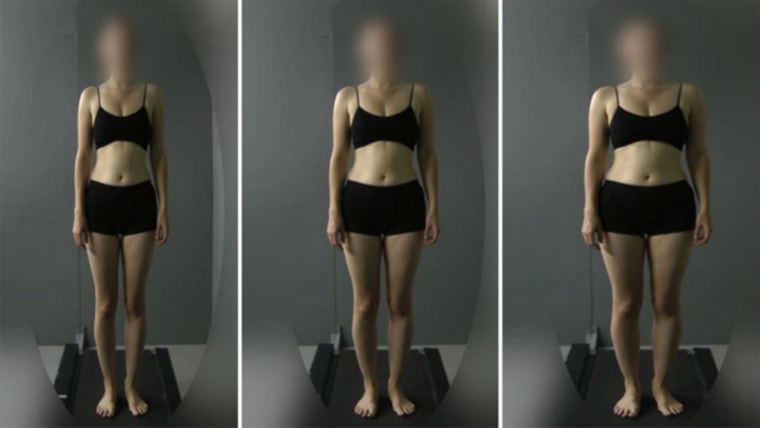It’s no secret that most women dislike at least something about their own bodies, and it’s no surprise to hear that constantly looking at image of super-skinny models makes things worse.
Now a team of British researchers thinks they’ve found a way to do something about that. They found that showing women slightly manipulated images helped them feel better about their own bodies.
When photographs of healthy-weight women were tweaked just a bit to make them look slightly overweight, the women shown that photograph felt better about their own bodies, the researchers found.
“We found that women who had been shown the larger images saw their own bodies as smaller and were happier with their own bodies,” said Dr. Helen Bould, a psychiatrist at Oxford University who led the study team.
They’re hoping the technique might be used to help children and adults with eating disorders feel better about themselves, which in turn can help stop dangerous eating behavior.
Doctors and other experts in treating eating disorders have been trying for years to persuade media to stop editing images of women to make them look thinner than they actually are, and have tried to persuade the fashion industry to stop favoring unhealthily thin models.
Italy, Spain and Israel banned the use of super-skinny models in 2013 and France followed suit in 2015.

Thin remains in, however, and studies have shown that girls as young as 3 wish to be slender.
Bould studies eating disorders in children.
“I am interested in how they perceive their bodies. That’s a really tricky thing to shift — their hatred of their bodies,” she said.
She and colleagues decided to study the effects of looking at other body sizes and shapes in adults first. “It seemed sensible to start with women who are well rather than women who have a current eating disorder,” she said.
They recruited 90 young women, aged 18 to 25, who were at healthy weights as measured by body mass index, or BMI.
“We had a series of photographs of normal women and we modified those women to look either larger or smaller,” Bould said.
Looking at those images affected how the women viewed their own bodies, Bould and colleagues reported in the journal Royal Society Open Science.
The editing is subtle, but it was enough to affect the women’s thinking.
“Feeling unhappy about your weight is not a good way to bring about weight loss."
“This study suggests that a move towards using images of women with a BMI in the healthy range in the media may help to reduce body dissatisfaction, and the associated risk of eating disorders,” the team wrote.
Bould puts it more simply. “What I guess you want in terms of being happier with your own body is comparing yourself to normal women around you, rather than the kind of images you see in the media,” she said.
But 40 percent of U.S. women are obese, and another 30 percent are overweight. Doesn’t that mean that perhaps women should not be content with their own bodies, at least not the majority of women who are overweight?
Bould says the opposite is true.
“Feeling unhappy about your weight is not a good way to bring about weight loss,” she said.
“When people feel unhappy about their bodies, they are not motivated to change. It just makes them feel pretty miserable.”
Studies show that fat-shaming doesn’t work, and even women at a healthy weight are prone to gain weight if they are not satisfied with their looks, Bould noted.
In a world where selfies rule and where Instagram fans spend hours and even days trying to take the most flattering pictures of themselves, how can people fight the pressure to be the thinnest, most attractive one out there?
“It’s really, really hard to manage social media,” Bould said.
“What you can do is choose what you are following,” she advised. “We can tell young people to think about what they are looking at and whether it’s helpful or unhelpful in the way that they look at their own bodies.”
What's the least body positive state in the U.S.?
Candace Cameron Bure shuts down body-shamer who commented on her weight
Why this fitness star shares unflattering photos on Instagram
